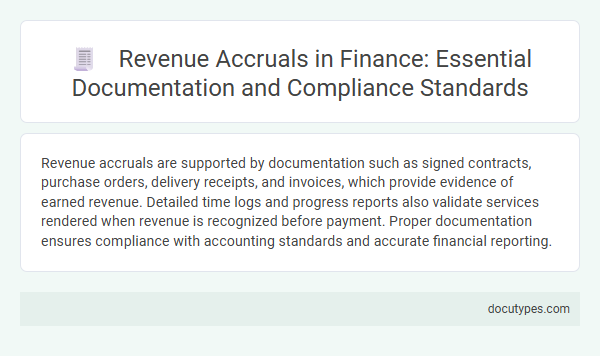Revenue accruals are supported by documentation such as signed contracts, purchase orders, delivery receipts, and invoices, which provide evidence of earned revenue. Detailed time logs and progress reports also validate services rendered when revenue is recognized before payment. Proper documentation ensures compliance with accounting standards and accurate financial reporting.
Understanding Revenue Accruals in Financial Reporting
Revenue accruals in financial reporting are supported by documentation such as sales invoices, contracts, and delivery receipts. These documents provide evidence of earned revenue despite cash not yet being received. Proper documentation ensures accurate matching of revenue to the correct accounting period, enhancing financial statement reliability.
Key Principles of Accrual Accounting
Revenue accruals are supported by documentation such as contracts, invoices, and delivery receipts that verify earning events and the transfer of goods or services. Key principles of accrual accounting require that revenue is recognized when it is earned, regardless of when cash is received, ensuring accurate matching of revenues and expenses. Proper documentation provides evidence for revenue recognition, facilitating compliance with accounting standards like GAAP and IFRS.
Essential Documentation for Revenue Accruals
| Documentation Type | Description | Role in Revenue Accruals |
|---|---|---|
| Sales Contracts | Agreements between the company and customers outlining terms, pricing, and delivery expectations. | Establishes the legal basis for revenue recognition and defines the conditions for accrual. |
| Invoices | Formal billing documents issued to customers detailing goods or services provided and amounts due. | Supports the timing and amount of revenue recognized in accrual accounting. |
| Delivery Receipts or Shipping Documents | Proof of goods or services delivered to customers, often including dates and quantities. | Confirms performance obligations have been met, enabling revenue accrual. |
| Work Orders or Service Reports | Records of services performed or milestones achieved for contract-based projects. | Validates partial or full completion required for revenue recognition under the percentage-of-completion method. |
| Revenue Recognition Policies | Internal accounting policies detailing the criteria and methods used to recognize revenue. | Ensures consistency and compliance with accounting standards like IFRS 15 or ASC 606. |
| Correspondence and Approvals | Communications and official sign-offs related to contract modifications, delivery confirmations, or disputes. | Provides additional evidence supporting the accuracy and legitimacy of accrued revenue amounts. |
Standard Procedures for Recording Accrued Revenue
Proper documentation is essential for accurate recognition of revenue accruals in financial statements. Standard procedures ensure compliance with accounting principles and support audit trails.
- Invoices - Detailed customer invoices provide evidence of earned revenue even if payment has not yet been received.
- Contracts and Agreements - Signed contracts outline the terms of service delivery and payment schedules, validating the revenue accrual.
- Delivery or Service Reports - Documentation confirming the completion of service or product delivery substantiates the timing and amount of accrued revenue.
Your adherence to these documentation standards facilitates accurate financial reporting and regulatory compliance.
Regulatory Compliance Standards for Revenue Accruals
Regulatory compliance standards such as ASC 606 and IFRS 15 provide clear guidelines for recognizing revenue accruals, ensuring that revenue is recorded when it is earned and realizable. Documentation supporting revenue accruals must include contracts, purchase orders, and invoices that validate the timing and amount of revenue recognition.
Audit trails and internal control records are essential for substantiating revenue accruals in compliance with regulatory authorities. Maintaining detailed records helps companies avoid misstatements and ensures adherence to financial reporting requirements under regulatory frameworks.
Internal Controls and Audit Requirements
Proper documentation is essential for supporting the recognition of revenue accruals, ensuring compliance with accounting standards and enhancing internal control effectiveness. Reliable records facilitate audit processes and demonstrate the accuracy of reported financial results.
- Revenue Recognition Policies - Clear documentation of company policies on when and how revenue is accrued establishes the framework for internal controls.
- Sales Contracts and Invoices - Detailed agreements and billing statements provide evidence of earned revenue and the timing of accruals.
- Audit Trail Records - System-generated logs and reconciliation reports support verification of accrual entries during internal and external audits.
Common Documentation Pitfalls and How to Avoid Them
Accurate documentation is essential for supporting the recognition of revenue accruals, ensuring compliance with accounting standards such as IFRS 15 and ASC 606. Common documents include signed contracts, purchase orders, delivery receipts, and detailed invoices that clearly outline the terms and fulfillment status.
One common documentation pitfall is incomplete or outdated contract information, which can lead to errors in revenue recognition timing. To avoid this, maintain up-to-date records and perform regular reviews of contract amendments and fulfillment milestones to ensure accurate accruals.
Best Practices for Accurate Accrual Documentation
Accurate revenue accruals depend on detailed supporting documentation that validates the timing and amount of revenue recognized. In finance, key documents include contracts, purchase orders, delivery receipts, and invoice copies.
Best practices for accrual documentation involve maintaining clear records that link revenue transactions to specific performance obligations. Regular reconciliation of accrual entries against these documents helps ensure correctness. Your finance team should implement standardized templates and secure storage systems to enhance audit readiness and transparency.
Industry-Specific Considerations in Revenue Accruals
What documentation supports the recognition of revenue accruals in finance? Accurate revenue accruals rely on contracts, purchase orders, and delivery receipts as primary documentation. Industry-specific documents such as service completion reports in consulting or progress certificates in construction also play a critical role in validating accrued revenue.
What Documentation Supports the Recognition of Revenue Accruals? Infographic

